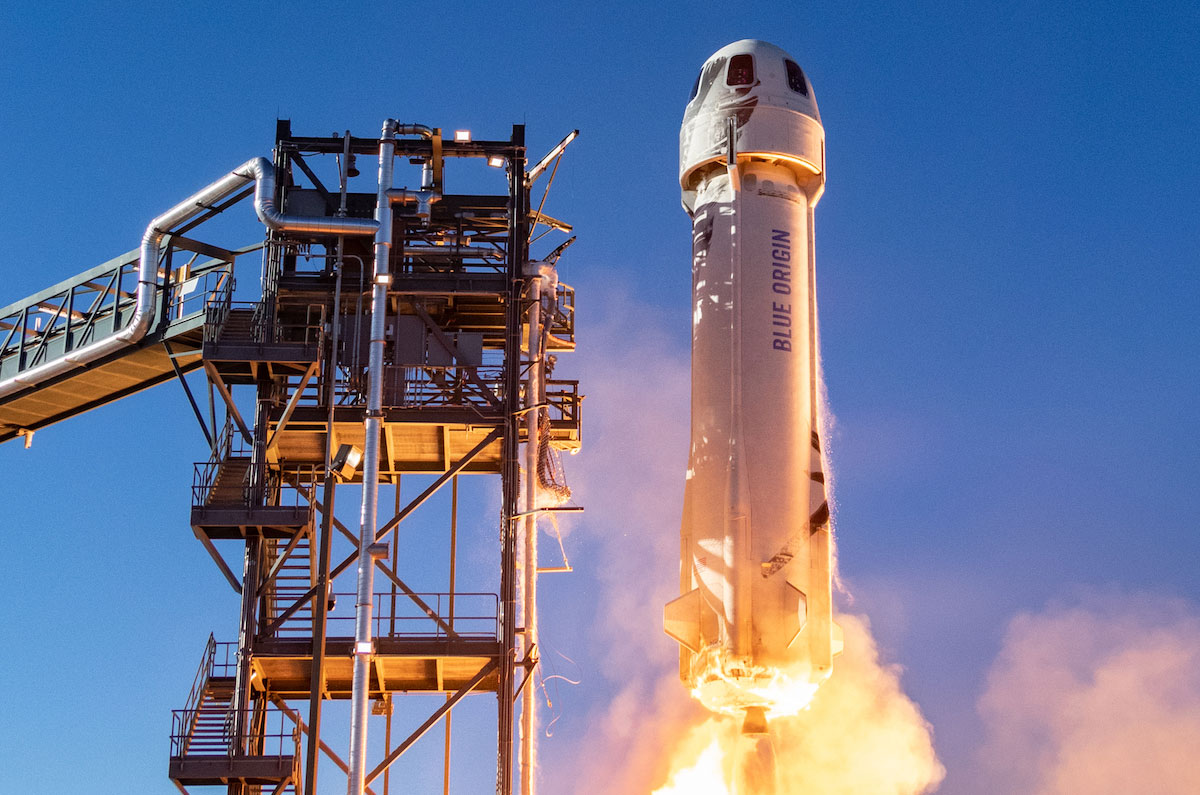Last time, I discussed how securing funding is a difficult process for many space agencies and why people and governments should continue to support the endeavors of these organizations. Today, I’ll be speaking on a topic that has dominated the media recently: SpaceX and Blue Origin, the two largest private space companies in the world.
Business and tech magnates such as Elon Musk and Jeff Bezos took the world by surprise when they announced serious space programs. Space travel for civilians always seemed like more a science fiction topic than an actual reality. However, when Jeff Bezos along with others, such as Richard Branson, actually went to space and returned to Earth, the world suddenly realized that space travel could actually be feasible in the near future. SpaceX was founded in 2002 when tech mogul Elon Musk wanted to decrease the price of space shuttle significantly. He first started the company out of a warehouse in California and expanded with the best and brightest employees from Fortune 500 companies around the world. The first ship, the Falcon 1, was the first ship to launch to Earth’s orbit and return to the surface. Eventually, the company also shattered records by docking a manned spacecraft on the International Space Station. Now, the company is focusing its efforts on Dragon, a next generation spacecraft that might be able to hold passengers.

Another company that has dominated the privatization of space travel and exploration is Blue Origin. Blue Origin was originally founded by Jeff Bezos in an attempt to be at the forefront of space exploration and possibly civilian space travel. The company’s initial development plan was to focus on suborbital flights which are shuttles that reach the top of the atmosphere but do not actually go into orbit. However, in 2014, the company began researching orbital flights and expanded their program into crafts that can escape orbit. Blue Origin is much different from many other organizations such as SpaceX because they have no aim to generate a lot of revenue, and are creating spaceships for the betterment of science and exploration. Companies like SpaceX actually complete missions for government organizations and generate billions in revenue annually in order to fund their developments. Bezos has said that he would use revenue from his Amazon stock to fund this endeavor.

Although these companies have had much success in creating space shuttles that are capable of incredible feats, there are many downsides to the privatization of space exploration. Because these organizations are private, they must secure their own funding. There are many ways of doing this; for example, SpaceX has completed government missions and generated revenue this way. However, as more companies become involved in space exploration, they are going to need investors. Investors like to see returns on their principle, so how are these companies going to generate enough money to repay their shareholders? Some have stated that telescope imagery should be taxed, or that analysts and media should have to pay for data acquired in the missions. For better or for worse, companies have become heavily involved in space exploration and it will be interesting to see the dividends of their extensive research and development.
Citations:
“Spacex.” Wikipedia, Wikimedia Foundation, 21 Sept. 2021, en.wikipedia.org/wiki/SpaceX.
“Blue Origin.” Wikipedia, Wikimedia Foundation, 19 Sept. 2021, en.wikipedia.org/wiki/Blue_Origin.
“Spacex.” Encyclopædia Britannica, Encyclopædia Britannica, Inc., www.britannica.com/topic/SpaceX.
Quora. “The Pros and Cons of Privatizing Space Exploration.” Forbes, Forbes Magazine, 30 June 2021, www.forbes.com/sites/quora/2017/04/04/the-pros-and-cons-of-privatizing-space-exploration/?sh=5599c4203319.
Fortune. “SpaceX.” Fortune, 25 Aug. 2020, fortune.com/company/spacex/.
Howell, Elizabeth. “Blue Origin: Quiet Plans for Spaceships.” Space.com, 16 July 2021, www.space.com/19584-blue-origin-quiet-plans-for-spaceships.html.